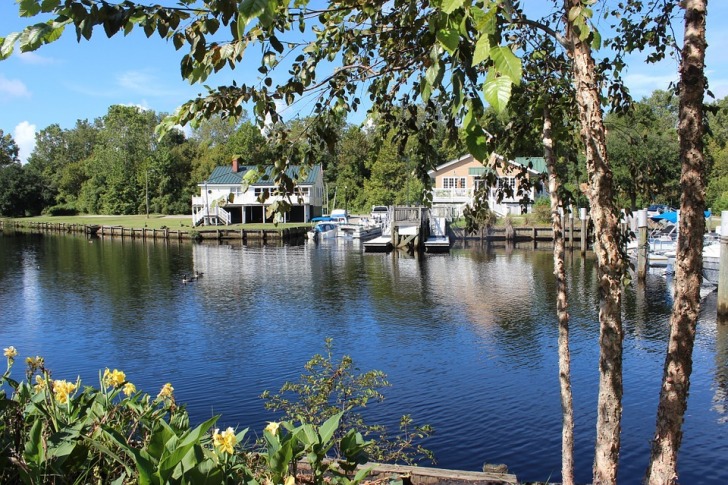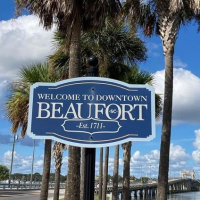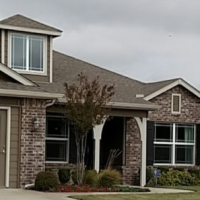Conway, S.C., is 15 miles from Myrtle Beach and the Atlantic Ocean, but it has managed to keep its identity as a historically charming southern town amidst all the tourism.
It is the third-oldest city in the state and was already established before the Revolutionary War.
The historic areas of downtown still exist, but there is also a modern feel with a fancy boardwalk along the Waccamaw River that goes through town.
It is a growing city with a lot of appeal for retirees and those looking for a new home.

Contents
Pros of Living in Conway
1. Scenery
While it is close to the ocean, Conway feels more like a southern river town.
It was built on a bluff over the Waccamaw River that flows into the ocean.
It has a nice boardwalk and the river that runs through the town is lined with ancient oak trees.
Its historic downtown is filled with the charm of the southern culture as well.
There are some very old buildings, but a lot of the downtown was rebuilt in the late 1800s after a big fire.
Flowers, especially in spring, also dot the landscape, which adds to the attractiveness.
2. Weather
Conway has very mild winters, which makes it attractive to retirees.
You may not need to even own a heavy coat as the temperature very rarely drops below 40, and snow is extremely rare.
Summers are hot, but it generally has a pleasant climate.
The entire year really is just two seasons, summer, and the rest of the year.
January is the coldest month and it can get below freezing at times, but usually just for a few hours.
3. Cost of living
The cost of living in South Carolina is lower than the national average, and Conway is a solid five percent below the national average as well.
It is much cheaper than nearby Myrtle Beach, and you can still enjoy the beach if you live in Conway.
Property taxes are generally low in South Carolina, and Conway has one of the lowest tax rates in the state.
4. Housing costs
The average home price in Conway is $187,000, which is 22 percent below the national average.
This is another advantage of being just off the beach, as houses are much cheaper than they are in nearby Myrtle Beach.
Conway has strong roots and 65 percent of the people in the city own their homes.
Rentals are available, and those costs are also below the national average.
5. Southern charm
Conway remains a classic southern town even if it is close to the touristy area of Myrtle Beach.
People are welcoming and friendly, and you will feel at home soon after moving to Conway.
People will speak to you on the street and will stop and talk for a while if you like.
It may be the slower-paced lifestyle, but people are generally more friendly in this part of the country.
They will also help you if you need help, like when your car breaks down.
6. Food
The south is famous for its food, and Conway is at the heart of that tradition.
Typically, in the south, almost everything is fried, and what is not is covered with gravy.
Add to that fresh seafood from the nearby ocean, and there is no limit to how much great food you can enjoy.
Fresh food abounds.
Eating healthily is easy, and not expensive.
Still, there will be a lot of temptations to enjoy fried food and other delicacies that may not be the best for your health.
7. Close, but not too close
The beach is just a few minutes away, and if you live in Conway, you have a relaxed place to retreat when you get tired of the beach.
It is close enough to Myrtle Beach to enjoy all that the resort beach town has to offer.
Conway is not nearly as crowded or as hectic as Myrtle Beach can get.
You have the best of both worlds here; the beach, and the slower-paced southern lifestyle.
8. Public transportation
In many southern towns, there is little, if any, public transportation available.
Conway is different, however.
Some buses will take you anywhere in Horry County, including all the beaches.
All of the public offices you need are in the small downtown area, and it is very easy to get around.
The city is also cyclist-friendly with special lanes for traffic.
Cons to Living in Conway
1. Summers are hot
While the temperatures are mild most of the year, summers can get very hot.
It is far enough inland that you do not get the benefit of the ocean breeze.
When there is no wind, the air can get very hot and humid.
It is hard if you do not have air conditioning.
Fortunately, the very hot periods of summer do not last all that long, but they can be almost unbearable when they are at their worst.
Humidity is also a big problem with the ocean not far away, and a river going through the town.
2. Summer traffic
Being close to Myrtle Beach and the ocean has its advantages.
One disadvantage is the tourist traffic in summer.
Inside Conway, it is not that bad, but at times getting out of town to go anywhere else can be a challenge.
Traffic can get backed up from the beach all the way to Conway at times.
The highways around Conway are crowded in the summer months, which might make you want to just stay home if you live in Conway.
Other than peak tourist season, the highways are in good condition and not overly crowded.
3. Hurricanes and tornadoes
There is the threat of hurricanes in the fall, and they can be deadly storms.
You can also get a tremendous amount of rain if a hurricane gets within 200 miles or so of you, so even if you do not get hit by a hurricane, you can still get a lot of its rain.
Traditionally, hurricanes have come inland further south, but there is that threat to contend with.
Tornadoes happen in spring, and can also be very destructive.
One problem is that people do not heed hurricane warnings, and there can be huge traffic jams when people realize a hurricane is really coming.
4. Insects
Mosquitos are very bad, and there are a lot of other insects that can also be pests.
There is a thing called a Palmetto Bug that looks like a roach but is much bigger and can fly.
Fire ants are another thing you will need to learn to avoid.
If you go outdoors much at all, you will have to contend with insects.
They will also get into your house no matter what you do.
Professional exterminators are always busy. 5.
5. Crime rate
It could be because there is some poverty in the area, but the crime rate in Conway is 50 percent higher than the national average.
The crime rate for the entire state is 35 percent above the national average.
Most of the crimes are property crimes, such as theft.
The violent crime rate is also high, but not as significant as the property crime rate.
The downtown area is very safe, but it is still good to avoid it alone at night.
6. Growing pains
Conway had 17,000 people in 2010, and that rose to 24,000 in 2020.
That is a huge increase in the population, and the city may struggle to keep up with that growth.
That will make housing costs go up, and the city will have to do more work to maintain the infrastructure.
So far it is handling the growth, but if it continues, it may become an issue.
7. Fried food
While the food is delicious in the south, it also has a well-earned reputation for not being the healthiest food one can eat.
Almost everything is fried, and that contributes to the problem.
The food is great.
The downside is that you will be tempted to eat a lot of things that are not healthy, and you will be tempted to eat a lot of them.
Delicious food is the reason there are a lot of overweight people in the south, and Conway is no exception.
8. Alligators
There are plenty of alligators in the marshy areas around Conway.
Rarely does one make its way onto a golf course or into a residential area, but they do at times.
They can be very big, they can run fast, and they can be very dangerous.
They have been known to eat small dogs.
They are just something to be aware of and avoid if you do see one.

Pros and Cons of Living in Conway, SC – Summary Table
| Pros of Living in Conway | Cons to Living in Conway |
|---|---|
| 1. Scenery | 1. Summers are hot |
| 2. Weather | 2. Summer traffic |
| 3. Cost of living | 3. Hurricanes and tornadoes |
| 4. Housing costs | 4. Insects |
| 5. Southern charm | 5. Crime rate |
| 6. Food | 6. Growing pains |
| 7. Close, but not too close | 7. Fried food |
| 8. Public transportation | 8. Alligators |
Conway Safety Overview
READ THE FULL REPORT: Conway Safety Review
Safety Index:
- OVERALL RISK: MEDIUM
- TRANSPORT & TAXIS RISK: LOW
- PICKPOCKETS RISK: LOW
- NATURAL DISASTERS RISK: MEDIUM
- MUGGING RISK: LOW
- TERRORISM RISK: LOW
- SCAMS RISK: MEDIUM
- WOMEN TRAVELERS RISK: LOW
Frequently Asked Questions
Is there much diversity in Conway?
The white population is about 63 percent and the black population is about 33 percent.
There is some diversity of culture as well.
It is not the most diverse place in the state, but it has some.
The Gullah culture adds diversity as well.
Were any Civil War battles fought in Conway?
Sort of.
In 1864, union troops attacked a salt-making plant in Conway, which had been supplying salt for the Confederate army.
It was a blow to the Confederate cause as salt was important as a preservative.
It was also the first land invasion conducted by the Marines.
What role did Conway play in the Civil War?
Two Conway residents signed the articles of secession in Charleston as the war began.
Conway supplied lumber and other raw materials for the Confederate army.
It was also a major supplier of salt.
Union troops from Main occupied the city for a time after the war.
Who were the Gullah people?
These were descendants of slaves that came from Golas and Kissi tribes in Africa.
Many came through Charleston.
They created a new culture that goes along the coast through Conway.
They have their own language and cuisine, as well as traditions.
The Gullahs have spread from North Carolina into Florida along the coastal areas.
What was the original name of Conway?
When Conway was founded in 1735, it was called Kingston Village.
It was the county seat for Kingston County.
In 1801, when the dust was still settling from the Revolutionary War, the county’s name was changed to Horry, and the city’s name was changed to Conwayborough.
In 1883 it was shortened to Conway.












Conway, South Carolina offers a unique blend of historic charm and modern amenities, making it an appealing place to live for retirees and those looking for a new home. However, it does have its drawbacks, such as hot summers, high crime rates, and the potential for natural disasters. Ultimately, the decision to live in Conway will depend on individual preferences and priorities.